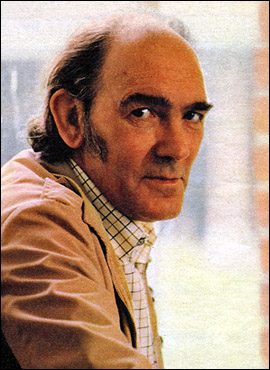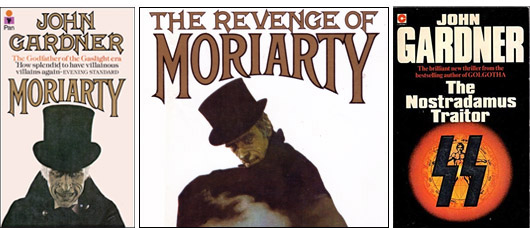 |
 |
Love ‘em
or hate ‘em, John Gardner's James Bond novels have divided the
Bond enthusiasts' community. While being successful in
America, the books have met with less acclaim in the UK. Now
nearly equalling lan Fleming's output of original James Bond
novels, it is high time that Gardner's contribution to the
James Bond myth is examined in the depth it deserves.
The
James Bond Bedside Companion author
Raymond Benson visited
John Gardner in March 1993 for this exclusive interview.
During their lengthy conversation Benson assesses each of the
Gardner 007 novels and discusses how they stand as works in
their own right and how the author has developed the character
of James Bond into a man for the 1990s.
The first in
a new series of James Bond novels was published in 1981. Its
title was LICENCE RENEWED - the author John Gardner.
Over the years, Mr. Gardner has received varying degrees of
praise and criticism from the public and Bond fans alike. It
seems no one can agree on the merits of his works, despite the
fact that the books have sold extremely well in the United
States (but oddly enough, not as well in the UK). |
|
|
It was 1980
when the board of directors of Glidrose Publications Ltd
(copyright holder of the James Bond literary property, and now
called Ian Fleming Productions Ltd.) decided
to bring 007 back to the printed page. The last attempt after
Ian Fleming's death resulted in the excellent COLONEL SUN by
Robert Markham, a pseudonym for Kingsley Amis. At the time, it
was thought that several different authors would write a Bond
novel, each using the Markham moniker. COLONEL SUN was only
moderately successful sales-wise despite its excellence, so
the idea was scrapped. Apart from two film novelizations by
Christopher Wood JAMES BOND, THE SPY WHO LOVED ME and JAMES
BOND AND MOONRAKER) in 1977 and 1979 respectively, and 1973's
brilliant JAMES BOND: THE AUTHORISED BIOGRAPHY OF 007 by John
Pearson, Bond had not been seen in print in any new adventures
for over a decade. |
 |
In finding an author, Glidrose
apparently tossed a few names around and ended up with five
possibilities. First on the list was John Gardner.
To
date, there have been twelve Gardner Bonds published, not
including a film novelization (Licence To Kill) which
the author does not consider part of his Bond oeuvre.
Negotiations are in the works for more - but only a couple
more, most likely. Gardner has expressed a wish to move on to
other things. It is also felt that since Ian Fleming wrote
fourteen titles in all, Gardner should stick to this number as
well. |
|
|
I readily admit that I had trouble warming to Gardner's
James Bond. Like most fans of the late Ian Fleming,
reading another author's attempts to breathe life into
what was a very personal creation for Fleming elicited a
certain protectiveness on my part. John Gardner is not
Ian Fleming, nor does he try to be. Granted, there are
certain traditional elements that he must include in his
books, such as the so-called “Fleming Effect” - the rich
attention paid to detail and minutiae. But from the
beginning, Gardner has written in his own voice, which
is certainly the only way any writer could be expected
to work. It took a bit of time for me to understand this
and to begin taking the new Bond books at face value. I have grown
to admire the Gardner books (some much more than others), and
I believe they have value in the James Bond enthusiast's
world. I especially think that they would make excellent bases
for films, and am perplexed as to why their potential has
never been exploited. Most of the Gardner books read like
screen treatments (though the author vehemently rejects the
notion that he wrote them with this in mind). Nevertheless,
they are actually more “filmable” than Fleming's original
works (I wish you'd tell Mr. Broccoli that! John
exclaims), in that they are action-oriented and seem
structured like a film. In many ways, I think they're better
than the “original” scripts the filmmakers are coming up with. |
|
I had the
great pleasure of visiting Mr Gardner in March 1993 for a
lengthy interview at his spacious home in Charlottesville,
Virginia.
He was quite a trooper during the interview, as he was having
difficulty with sciatica and really didn't feel up to sitting
and talking all day. (Ian Fleming had sciatica problems, too.
A coincidence, or is James Bond just a pain in the...?) His
comments appear in italics throughout the following. John
Gardner was born in 1926 in the village of Seaton Delaval,
near Newcastle-Upon-Tyne in the northeast of England. His
father was a priest in charge of a church in the mining
community. He lived there until the age of seven, when his
family moved south. There, his father became head
administrator at a girls' school. Gardner admits that he did
not take to school at all, and that growing up in this
Catholic environment was “weird”. During his teens, he fancied
becoming a magician. He became fairly adept and performed in
front of audiences for years. When war broke out he lied about
his age to enlist and after serving in the Royal Marines, he
studied at Cambridge and St. Stephen's House at Oxford.
After the war I ended up in journalism. I concentrated on the
theatrical arts, and even wrote some plays. I sent one play to
the BBC. They wrote back and said, 'We don't find anything
wrong with your play, but on the other hand, we don't find
anything right with it, so we suggest you turn to some other
kind of work.' This only hardened my resolve to keep writing. |
 |
|
|
|
|
Gardner became a full-time theatre reviewer, based
at Stratford-Upon-Avon, just as Peter Hall was leading the
Royal Shakespeare Company to new glory. He covered most major
classical theatre in the late Fifties/early Sixties and was the
first British journalist to attend the full series of first nights
at Stratford in a season. It was at this time that he began to
write something for publication.
After
working on an autobiographical book, Gardner wrote The
Liquidator, published in 1964. It was a blatant spoof on James
Bond (although he denies it was specifically a jab at 007), and
was a surprise success.
The
main character, Boysie Oakes, was an assassin for the British
Secret Service, but he was a coward and secretly hired hit men to
do his dirty work for him! In addition, he became ill on
aeroplanes.
My
first piece of fiction, unhappily for me, was an overnight
success. In a way, this was very bad for me. I carried on working
as a journalist for about a year after that success. After the
second Boysie Oakes book, one newspaper said that, “Gardner writes
full time now”. Well, I'd been writing full time for years! But
that statement in the press prompted me to leave journalism and
become self-employed.
Gardner wrote more Boysie Oakes books and two novels about
Sherlock Holmes’ nemesis, Professor Moriarty. Later books, such as
The Garden of Weapons and The Nostradamus Traitor,
were more in the realistic style of John Le Carré.
During the Eighties, while writing the Bond's, he wrote the
critically acclaimed Secret Generations trilogy. |
 |
|
|
|
I work seven
days a week, unless I’m out on research or a vacation. I would much
rather be living in my real world, which is fiction, because the
world we're in at the moment is fantasy! |
|
CONTINUED |
|
|
|
|
